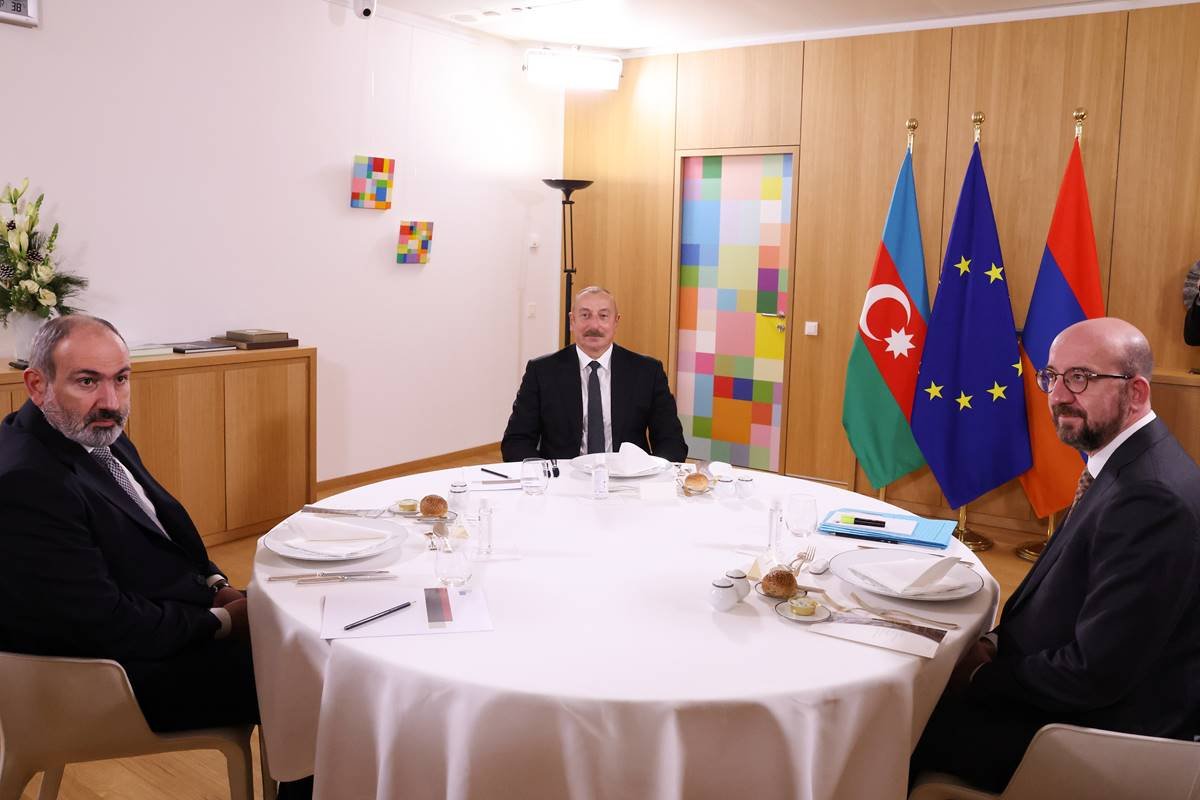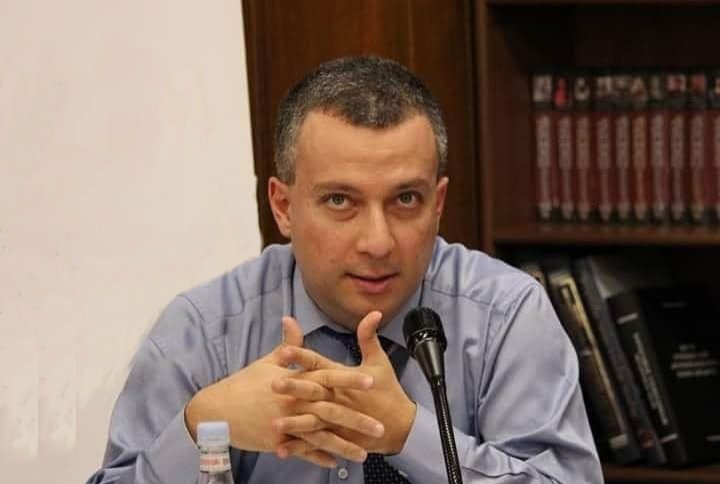Regional economic cooperation in the South Caucasus has always been the focus of international organizations and external powers as a tangible way to stabilize the region and pave the way for conflict settlement. After the end of the first Karabakh war in 1994, in close cooperation with Turkey and under strong US support, Azerbaijan launched several regional infrastructure projects—oil and gas pipelines and railways connecting Azerbaijan with Turkey via Georgia. Azerbaijan and Turkey excluded Armenia from these projects and imposed an economic blockade, viewing this exclusion as a tool to force Armenia to give up Nagorno Karabakh. Azerbaijan and Turkey actively circulated a narrative about poor and underdeveloped Armenia, which stayed behind its neighbors because of the Nagorno Karabakh conflict. The message to Armenia was clear—give up Nagorno Karabakh, and you will live a much better life enjoying cheap Turkish and Azerbaijani goods and investments.
Meanwhile, international organizations looked at this issue from a different angle—let us develop Armenia-Azerbaijan economic cooperation first and hope that economic benefits will make it easier for the sides to reach a compromise. Armenia and the Nagorno Karabakh Republic supported this approach, expressing readiness to cooperate with Azerbaijan while continuing negotiations on the conflict settlement. However, Azerbaijan firmly rejected all options to cooperate with Armenia or Nagorno Karabakh, arguing that any cooperation is possible only after Armenia gives up Nagorno Karabakh. Turkey fully supported this approach of Azerbaijan, thwarting the 2008-2009 Turkey–Armenia normalization process under intense pressure from Azerbaijan.

Ilham Aliyev)
The 2020 Artsakh War and Azerbaijan’s decisive victory reinvigorated discussions about launching regional economic cooperation, including the restoration of communications. The November 9, 2020 trilateral statement envisaged the restoration of all communications, including routes connecting Azerbaijan with its exclave Nakhichevan via Armenia. Armenia and Azerbaijan reconfirmed their commitments during meetings with Russian President Vladimir Putin on January 11, 2021 and November 26, 2021. On December 14, 2021, they adopted the final decision to restore the Azerbaijan-Nakhichevan-Armenia railway during their meeting with European Council president Charles Michel. Turkey perceived Armenia’s defeat in the 2020 Karabakh war and the Armenian government’s decision to give up its security guarantees to Karabakh as a realization by the Armenian government of one of Turkey’s preconditions for starting the Armenia–Turkey normalization process. Thus, Armenia gave up Nagorno Karabakh; therefore, Turkey may start the normalization process. Armenia and Turkey appointed special representatives who held their first meeting in Moscow and will meet again on February 24 in Vienna. The international community reacted positively to the launch of the Armenia–Turkey normalization process and an agreement between Armenia and Azerbaijan to reconstruct the Soviet-era railway as a first step in developing bilateral economic relations. External players, especially the European Union, hope that the gradual development of economic relations between Armenia and Azerbaijan and Armenia and Turkey will decrease the probability of a new conflict. According to this logic, if parts of Armenian and Azerbaijani societies will benefit financially from bilateral cooperation, they will resist the outbreak of new conflict, thus becoming crucial stakeholders for stability. External players are ready to fund small and mid-scale economic projects connecting Armenian and Azerbaijani communities or provinces.
However, the international community and actors directly or indirectly involved in the regional security dynamics should not forget that lasting peace and stability between Armenia and Azerbaijan are achievable only if vital national interests of all sides are protected. After the 2020 Karabakh war, Azerbaijan pursued a maximalist and radical policy, arguing that the war solved the Karabakh conflict and stating that Nagorno Karabakh does not exist anymore. Azerbaijan claims that after the withdrawal of the Russian peacekeepers, Karabakh will receive no status, and Armenians living there should either accept Azerbaijani citizenship or leave. Given the fact that 15 months after the end of the 2020 Karabakh war, there are no Armenians living in Azerbaijani-controlled territories, the only option for Armenians is to leave Karabakh. The international community interprets Pashinyan’s victory at the June 2021 early parliamentary elections as evidence that the majority of the Armenian society accepted the loss, forgot about Nagorno Karabakh and is ready to embrace Azerbaijan and Turkey. However, this is a misleading perception. The recent International Republican Institute’s survey in Armenia proved that less than one-percent of Armenians are ready to see Nagorno Karabakh as a part of Azerbaijan.
In comparison, the absolute majority (70 percent) see it either as an independent state or part of Armenia. Armenian society has slowly started to recover from the trauma and shock of the war. Thus, if the international community wants to secure lasting stability in the South Caucasus, it should push forward the political process for conflict settlement in parallel with programs on boosting economic cooperation. Meanwhile, economic cooperation and projects should not focus only on Armenia–Azerbaijan or Armenia–Turkey. Nagorno Karabakh should also benefit from these projects, and part of the available money should go there. Otherwise, recent activities aiming to restore economic relations between Yerevan and Baku and Yerevan and Ankara look like a bribe offered by the international community to Armenia to ease the pain of losing Nagorno Karabakh. This approach will not bring long-term stability and security to the region, only creating an imitation of the peacebuilding process.



It is hard to understand the logic of linking Turkey-Nakhichevan-Armenia-Azerbaijan rail project. Turkey, Azerbaijan, Russia will be the only ones benefiting from this railway link. A South-North project linking the Arabian gulf to Armenia via Iran, India, Gulf states, and Georgia to the Black Sea and Europe and Ukraine will benefit Armenia and all the above-mentioned countries. Iran can export oil/gas to Europe thus providing an additional option to Europe for their energy needs.
You don’t pay attention to geopolitics it seems.
1) The South North Corridor does not involve the Gulf states.
2) If the EU is pressured by the USA, then it will not accept Iran’s oil.
3) Russia is already part of the South North Corridor.
I am not from any of these regions but I enjoy reading about what is going on in this area of the world, both the positive and all else. I know so little. Peace to all of you May every region get what they want out of this.
That was a good article Benyamin,
Armenia should vigilantly utilize all potentials and mitigate the risks. Roads through your land should bring prosperity to Armenians, not bypassing them. You have some good chess players in Armenia. Take your time and chose your moves carefully. Look at the map and see the risk of opening up a corridor from West to East. Iran repeatedly indicated full access of Armenia to all its ports, no exception, and similar to any Iranian corporate or individual with no tariff (i.e., You have access to your fatherland, every Square inch of it). Regarding Commentators’ misspelling the name of our waterway, I had a higher expectation from all Armenians, You are all descendent of our great forefathers (Well before Christianity, Judaism, etc.). As a sign of respect to those forefathers, we should never, ever misspell those names. We are all One united nation after all.